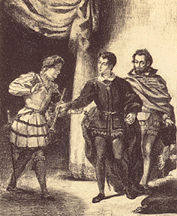Rosencrantz and Guildenstern
| Rosencrantz and Guildenstern | |
|---|---|

A lithograph of Rosencrantz and Guildenstern in the flute scene from Hamlet by Eugène Delacroix
|
|
| Creator | William Shakespeare |
| Play | Hamlet |
Rosencrantz and Guildenstern are characters in William Shakespeare's tragedy Hamlet. They are childhood friends of Hamlet, summoned by King Claudius to distract the prince from his apparent madness and if possible to ascertain the cause of it. The characters were revived in W. S. Gilbert's satire, Rosencrantz and Guildenstern, and as the alienated heroes of Tom Stoppard's absurdist play, Rosencrantz and Guildenstern Are Dead.
Rosencrantz ("rosary") and Gyldenstjerne/Gyllenstierna ("golden star") were names of Danish (and Norwegian, and Swedish) noble families of the 16th century; records of the Danish royal coronation of 1596 show that one tenth of the aristocrats participating bore one or the other name. James Voelkel suggests that the characters were named after Frederik Rosenkrantz and Knud Gyldenstierne, cousins of Tycho Brahe who had visited England in 1592.
The majority of characters in Hamlet have classical names, in contrast to the "particularly Danish" ones of Rosencrantz and Guildenstern. The names were common in the court of Frederick II and Christian IV, and also at the University of Wittenberg, an institution where Hamlet is mentioned as having studied (he refers to them as "my two schoolfellows").
In Hamlet, Rosencrantz and Guildenstern first appear in , Scene 2, where they attempt to place themselves in the confidence of Prince Hamlet, their childhood friend. The smooth and courtly language they employ immediately establishes them as sycophants who are really serving as spies for the corrupt King Claudius, Hamlet's uncle, who usurped the throne and constantly attempts to check his nephew. Hamlet welcomes them as "excellent good friends", but, seeing through their guise, comments that they won't "deal justly" with him about their mission. Realising that he lacks allies except for Horatio, Hamlet gives the speech "What a piece of work is a man" to Rosencrantz and Guildenstern.
...
Wikipedia
